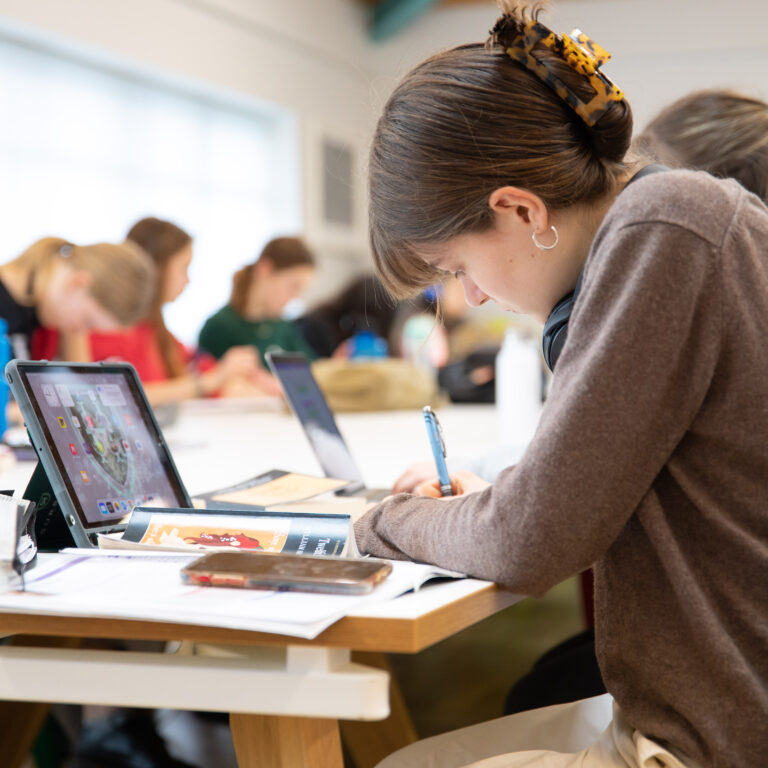Examination Board: Edexcel
What does studying Psychology involve?
Psychology is the scientific study of people; how they think, how they act, react and interact. Psychology is concerned with all aspects of behaviour and the thoughts, feelings and motivations behind it. Psychologists and psychological research have a big impact on all aspects of public life; particularly in areas such as education, health, the economy, industry, the media and government.
Studying Psychology will not only provide you with a clearer picture into the science of human behaviour and attempts to explain it, but it will help you to investigate some of the following practical problems:
■ Why are our memories not accurate?
■ How can we help people overcome phobias?
■ How can we speed up recovery from brain injury?
■ Why do some people suffer addictions?
■ Why do atrocities like genocide occur?
How will I know if I will be successful?
Psychology is ideal for students who have a very sound ability in Science, English and Mathematics. There is a large amount of research to investigate and become familiar with; therefore, a capacity to engage enthusiastically with the reading material is essential. There is a large scientific emphasis within the A-level, so students will need to be confident scientists. 10% of the exam tests pure mathematical skills students are taught throughout the course. Students will be expected to calculate Mann-Whitney, Spearman’s Rho, Chi-Squared and Wilcoxon statistical tests.
What topics will I study?
During the first year, students will be introduced to four scientific approaches to study human behaviour: Social (how we behave based on the group), Cognitive (how we process information), Biological (how our genes, brain structure and hormones influence our behaviour) and Learning (how we learn from our environment). During the course, students will be critically analysing the research methods used to investigate behaviour. During the second year, students will examine two applied topics in Psychology; Clinical (examining abnormality) and Child Psychology (attachment and understanding Autism), which bring together explanations from different approaches and engages students in issues and debates in contemporary Psychology.
This qualification consists of three externally-examined papers at the end of the two-year period.
Qualification aims and objectives
The aims and objectives of the Pearson Edexcel Level 3 Advanced GCE in Psychology are to enable students to:
■ Develop essential knowledge and understanding of different areas of the subject and how they relate to each other
■ Develop and demonstrate a deep appreciation of the skills, knowledge and understanding of scientific methods
■ Develop competence and confidence in a variety of practical, mathematical and problem-solving skills
■ Develop interest in and enthusiasm for the subject, including developing an interest in further study and careers associated with the subject
■ Appreciate how society makes decisions about scientific issues and how the sciences contribute to the success of the economy and society.
Incorporation of Practicals and How Science Works
A practical focus is embedded within this course. A series of short and manageable practical experiments and tests accompany the first four approaches and allow students to develop an active knowledge of the scientific aspects of Psychology.
What skills will I develop and where could studying this subject lead me?
The Psychology course has been designed to provide a broad introduction to the scope and nature of Psychology as a science. The emphasis is on applying knowledge and understanding rather than just acquiring knowledge, thereby developing students’ transferable skills of analysis, evaluation and critical thinking. Further to this, Psychology students will also develop strong transferable essay writing skills, report writing and skills of statistical analysis.
Currently, there are over 300 Psychology courses at degree level. It is an extremely popular and highly competitive subject to study at degree level, with graduates being very employable due to the nature and variety of skills acquired at A-level and university.
Psychology Assessments
Paper 1 – Foundations in Psychology (35%)
Content overview
■ Topic 1: Social Psychology
■ Topic 2: Cognitive Psychology
■ Topic 3: Biological Psychology
■ Topic 4: Learning Theories
Assessment overview
■ Written examination.
■ Students must answer all questions from five sections.
■ Sections A–D total 70 marks and comprise mixed question types, including stimulus and data response, short answer and extended-response questions and cover the topic areas as follows:
Section A: Social Psychology
Section B: Cognitive Psychology
Section C: Biological Psychology
Section D: Learning Theories
■ Section E: Issues and Debates has 20 marks and comprises two extended- response questions, covering the topic area of issues and debates in Psychology.
■ The assessment is 2 hours long.
■ The assessment consists of 90 marks.
■ The formulae and statistical tables given in Appendix 4: Formulae and statistical tables will also be given in the paper.
■ Calculators may be used in the examination.
Paper 2 – Applications of Psychology (35%)
Content overview
Mandatory content
■ Topic 5: Clinical Psychology
Optional topic
■ Topic 6: Child Psychology
Assessment overview
■ Written examination.
■ The paper is composed of two sections. Students must answer all questions from Section A and all questions from a choice of three optional topic areas in Section B.
■ Section A has 54 marks and comprises of mixed question types, including data and stimulus response, short answer and extended-response questions with a 20-mark response covering the topic area of Clinical Psychology.
■ Section B is an option topic and at Surbiton High School our option is Child Psychology.
Each section totals 36 marks and comprises mixed question types, including stimulus and data response, short answer and extended- response questions.
■ The assessment is 2 hours long.
■ The assessment consists of 90 marks.
■ The formulae and statistical tables given in Appendix 4: Formulae and statistical tables will also be given in the paper.
■ Calculators may be used in the examination.
Paper 3 – Psychological Skills (30%)
Content overview
Topic 7: Psychological Skills:
■ Methods
■ Synoptic review of studies
■ Issues and debates
Assessment overview
■ Written examination.
■ Students must answer all questions from three sections.
■ Section A has 24 marks and comprises mixed question types, including stimulus and data response and short-answer questions, covering the topic area of research methods.
■ Section B has 24 marks and comprises mixed question types, including stimulus and data response and short-answer questions based on psychological studies and one extended- response question based on classic studies given in Topics 1 to 5.
■ Section C has 32 marks and comprises two extended-response questions, covering the topic area of issues and debates in Psychology.
■ The assessment is 2 hours long.
■ The assessment consists of 80 marks.
■ The formulae and statistical tables given in Appendix 4: Formulae and statistical tables will also be given in the paper.
■ Calculators may be used in the examination.





